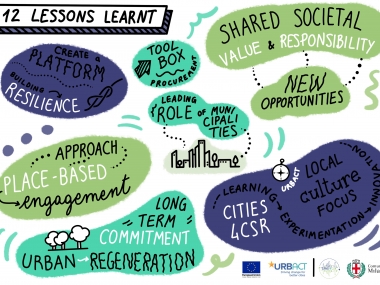The Local Legacies of the CITIES4CSR Network: New Understandings, Practices and Relationships to Build From
Edited on
20 July 2022As URBACT Action Planning Networks conclude their work after three eventful years, it is time to take stock. In this last article, Lead Expert Dr. Steffen Wetzstein assesses local impact and improvements across our ten CITIES4CSR partner cities.

From Endings to Beginnings
You are reading the last article of CITIES4CSR; the first URBACT Action Planning Network (APN) that has focused on Corporate Social Responsibility as means to solve urban problems. After three long years, severally disrupted by the COVID-19 pandemic and the recent War of Russia against Ukraine, our project officially comes to an end. Time to reflect on journey, achievements and transformations. I would like to particularly reflect here on noteworthy emerging practices and new understandings across our ten project partner cities. My hope is that by demonstrating the added value URBACT-methodology and support have created locally, other cities will be inspired to join one of the new networks of the next APN round in the quest for better urban and societal outcomes across our continent.
Rise of Good Practices
Some of our project partners joined CITIES4CSR with already well-established good practices in place. Three examples shall illustrate this point. Budaörs (Hungary) had enshrined the principle of Public Social Responsibility in local governmental practice; an interesting concept that calls for local and regional governments to ensure public service delivery in the name of common good and community values. Nantes (France), empowered and supported by their existing CSR-platform, had established state-of-the-art equal gender practices such as employment negotiation training schemes that have benefited thousands of women over recent years. And Molina de Segura (Spain) had created a strong stakeholder-inclusive local engagement culture. This advantage has been instrumental for immediate and intense URBACT Local Group action during URBACT Phase 1.
Yet, numerous new and emerging practices and activities have been added locally during three URBACT years. Those pursuing environmental and climate-saving goals have become a network favourite. In Vratsa (Bulgaria), for example, emerging ‘green’ practices in the areas of waste collection and urban transport have the potential for broader nation-wide impact. URBACT project efforts helped to accelerate the creation, diffusion, communication and management of these practices. A demonstrable local impact can also be noted for Budaörs (Hungary) where CSR-mediated communal tree-planting has been publicly communicated via a brand-new municipal ‘green’ Facebook page. Sofia, finally, created a new ‘green’ awards model including jury assessment details that will foster more environmentally sound urban and business practice for Bulgaria’s Capital in the future.
Not less invigorating for public-private-community partnering has been the urgent need to confront social inequality and deprivation. Rijeka (Croatia) has introduced and practiced the CSR-tool of local participatory hospitality events – for example hands-on cooking classes. Beneficiaries, often passive receivers of donations only, can become active, involved and learning participants in the process. Our Lead Partner Milan (Italy), attempting to improve the attractiveness of municipal primary schools in disadvantaged neighbourhoods, mobilised CSR-actions for youth job orientation, science and technology skills promotion and digital upgrading. Molina de Segura brought together three separate social intervention strands - urban planning, socio-education and health/sanitation - in form of an integrated and innovative neighbourhood-centred project that holds the promise of informing city-wide CSR strategy development.
URBACT is centrally about local stakeholder engagement for the good of people and place. So, which promising new engagement practices have arisen under CITIES4CSR? Three examples. First, Kekava (Latvia) came up with the Hackathon model of shared brainstorming as an innovative technology-based addition to the suite of voluntary local mobilisation and prioritisation practices. Second, Milan showcased during our final Transnational Meeting a much-applauded relational engagement model in form of Networking Drinks. Simply a synthesis of traditional dinner with extensive mingling opportunities, it has convinced me and many network partners as effective means to meet and greet people without missing out on quality food. Third, Sofia (Bulgaria) utilised the power of organising in-person events for a comprehensive Stakeholder Roundtable during the Lead Expert/Lead Partner visit in URBACT phase 1. The inclusive invitation list and the open, dialogue-oriented format facilitated useful early project discussions that set the right tone for further action-and initiative planning.
New Mechanisms for Exchange and Collaboration
One of the modern mechanisms for effective engagement under digital conditions are platforms. In CITIES4CSR, platform development has been an important topic right from the beginning. In fact, the local project teams of Molina de Segura and Guimarães (Portugal) got very inspired by Nantes’ platform history, and consequently developed their own versions. In Molina de Segura the platform has become an open digital tool for CSR-community building while in Guimarães it has been about creating a foundation for CSR-mediated resource exchange between economic and social actors. Meanwhile the URBACT Local Group in Nantes worked diligently to further develop their already successful model. Their concern has been with measuring firm behaviours in order to assess progress and remaining gaps towards achieving the Global Sustainable Development Goals.
Why are platforms such hotly debated topics these days? In sum, as digitally mediated social and institutional enablers of transformations they not only create space for shared identity construction but are also promising capacity-building mechanisms for good practice development and exchange. Moreover, as problem-solving tools they help to respond efficiently to public and private needs and aspirations. Central remains the question of how to translate the technological possibilities of platform infrastructures into valuable local social collaboration!
Our network philosophy essentially builds on the notion that cities are better off if Municipalities successfully mobilise local CSR-ecosystems; in order to complement public services and good provision and/or by shifting business practice towards better social and environmental outcomes. However, this vision often crucially relies on a linking mechanism in the middle, a broker of exchange. It is therefore no surprise that Milan has thought hard about reconfiguring their municipal interface with business and non-profits. In Bratislava, intermediation has been an incentive to introduce a municipal business liaison officer position that has been coordinating the successful 10,000 trees planting campaign. Interestingly, this investment could be the first step toward an effective CSR-donation reception infrastructure for Slovakia’s Capital. In Rijeka, the pre-existing Association for the Homeless and Socially Vulnerable Persons (Oaza) has moved more centre stage as social gatekeeper and mediator under URBACT.
On reflection, intermediaries in CSR-ecosystems are connectors, bridge builders and exchange accelerators; especially in respect to linking up Municipalities and CSR-stakeholders. For CITIES4CSR, this functional link has been imagined as taking the shape of existing or new organisations, fit-for-purpose entities such as one-stop-shops, new organisational positions or informal exchange mechanisms. Success, at the end of the day, will depend on how effectively we can overcome institutional inertia, constituency politics and cultural resistance that holds back innovation.
Emerging Understandings and Awareness
URBACT Action Planning Networks, in particular those that confront the ‘how’ of societal change, have traditionally performed best in the areas of thematic knowledge boosting, growing understandings and raising awareness. CITIES4CSR has been no exception. For local actors and citizens in Vratsa, for example, the theme of environmental protection has been promoted for the first time in a more systematic manner. Guimarães has learned valuable lessons about the ‘do’s’ and ‘dont’s’ of local procurement and the underlying legal constraints. Milan’s chief knowledge gain I would compare to a big mirror that reflects without distortion the current state of the interface between Municipality and CSR-community. Without doubt, awareness has grown across all cities about the capacities of municipal administrative systems to partner with business and other stakeholders to respond to local need and opportunity.
Collectively, we have learned a great deal about Corporate Social Responsibility in an urban context. Our four CITIES4CSR Masterclasses in 2021 highlighted different aspects of CSR-led local impulses; as activator of ‘helping your neighbour’ social changes, as kick-starter of ‘saving the earth’ environmental practices, as organising frame for strategic public procurement and as ingredient of shared urban value creation. What stood out for me was the fact that CSR nowadays incorporates not just larger businesses but entrepreneurs, public providers, non-profit organisations, citizen associations and many volunteers as well. In fact, CSR may not be the best term to describe this type of contemporary voluntary local alliances for improving the status-quo. So critically revisiting CSR-definitions and concepts may be a rewarding task for academics and researchers. What is clear, nevertheless, is the central role of Municipalities in activating, guiding, supporting and nurturing this collaborating ecosystem of local actors.
Final Outlook
Admittedly, we all felt a bit emotional at our last network outreach event several weeks ago in Brussels about the fact that three shared URBACT years are coming to an end. It is quite unlikely that we will work together again in an international project. Moments of farewell not seldom raise the question of legacy. Examining local progress and potential I suggest that there are grounds for optimism on this matter. After successful intra-network co-learning local implementation roadmaps and longer-term governance models are relatively robust, and in some cases already linked to sustainable finance. Also, there will be plenty of new opportunities for follow-up resourcing that will surely reach all cities and regions during the next EU-investment rounds. And concerning motivation and preferred topics for another URBACT network participation the local Budaörs team already indicated strong interest for a platform-building topic. One thing is sure, the first URBACT network on Corporate Social Responsibility will surely not stop having a measurable local impact after the official project ends in August 2022. I am absolutely convinced it will continue to make a positive difference in multiple and creative ways in the future.
Article written by Steffen Wetzstein (CITIES4CSR Lead Expert)
 Submitted by Alessia Dagradi on
Submitted by Alessia Dagradi on
